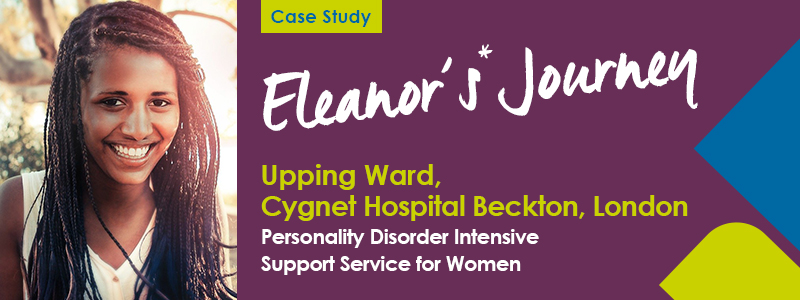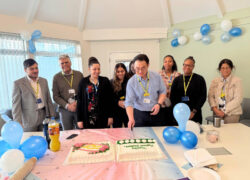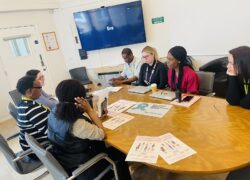
Eleanor’s* history
By the age of six, Eleanor’s father had left home, her mother had passed away and she was placed in the care of her grandparents. During childhood, she witnessed domestic violence and was a victim of sexual abuse. Aged 14, Eleanor was referred to CAMHS and assessed as suffering a delayed grief reaction. On re-referral aged 16, she was offered help with anger management and a growing alcohol and substance abuse problem. Aged 17 Eleanor was self-harming regularly and her behavioural problems escalated further in her late teens into fire-setting and significant violence toward others, as well as increasingly serious deliberate self-harm, intoxication and suicidality.
Admissions to inpatient psychiatric services began when Eleanor was 18, escalating to Medium Secure services where she stayed for three years, before a gradual stepdown via Low Secure to a community residential rehabilitation service in her early 20s. Eleanor still self-harmed, for example on the anniversary of her mother’s death, but she did well there, even coping impressively with losses of staff with whom she had formed close bonds. Until, that is, an encounter that triggered memories of her childhood sexual abuse. There followed three further years of escalating crises, characterised once again by violence, self-harm and intoxication.
When Eleanor came to us
Eleanor, now aged 25, had been in a Psychiatric Intensive Care Unit (PICU) for ten days when we assessed her. It seemed she had been scared in the community and known she needed a more containing environment, her presentation and ongoing issues with alcohol and medication compliance triggering multiple, often short acute admissions. Now, a little more settled, she wanted to undertake a course of DBT (Dialectical Behaviour Therapy). Reports indicated good previous engagement in therapies but her risk and acuity was high.
Other personality disorder services declined Eleanor’s referral due to recent incidents of violence and aggression requiring seclusion and IM medication. They suggested a period of 1-3 months’ further stabilisation, with admission thereafter conditional on no further incidents of violence and aggression, a medication review, a clear commitment to engagement, and for Eleanor to have utilised section 17 leave into the community safely and without alcohol use.
Eleanor and her clinical/commissioning team, however, saw these goals as unattainable in local services and were eager to progress matters. Upping Ward at Cygnet Hospital Beckton was just opening and geared specifically to cater for the needs of women with higher acuity, greater diagnostic complexity and less readiness to engage in treatment than our standard personality disorder rehabilitation services could manage.
Eleanor appeared complex and risky. She had also by now become quite institutionalised. She was morbidly obese, incontinent, rarely showered and had poor oral hygiene.
At the same time, she showed some insight, a degree of reflectiveness that both her assessor and Upping Ward’s multi-disciplinary team (MDT) responded warmly toward, and an eagerness to turn her life around, even in the context of strong urges to escape her inner torment with self-harm and her other former coping strategies. She said: “these thoughts are bad… my head’s a bit all over the place… almost all the time; I do try to manage it but sometimes I give in… it’s too strong; I want to do more therapy to sort it out.”
The Upping Ward MDT felt they could do some productive work with Eleanor and she was offered a place.
Eleanor’s care
One of the principles the Upping Ward MDT try to establish with service users early on relates to ownership of their recovery, with the MDT/service user relationship framed as a collaboration. Eleanor found this hard. In fact, given her weak sense of agency and very low self-image, anything suggesting self-worth was hard for her.
Many interventions with Eleanor early on were about visualising a future, establishing specific goals to make that future happen, and identifying steps to reach these goals. A lot of motivational interventions in this regard came from the Occupational Therapy team, while psychology validated Eleanor’s sense of struggle when her mood was low, with a shared metaphor of ‘a long road to recovery’.
The medical, nursing and HCA teams also gave Eleanor validation and quickly established themselves as trustworthy, non-judgemental allies, so that however hard Eleanor was finding things she knew she could talk about her urges to self-harm and the triggers with which she was struggling, and get an intelligent, validating response. A relationship of trust developed where Eleanor would accept guidance from the team, however hard. Early on this manifested, for example, in her being willing to leave her room to try and tolerate the excruciating dread around being with others in communal spaces. Later it would be more around accepting encouragement to chair her own ward round.
A second important principle the Upping Ward MDT try to establish is that relationships can be healing. By ensuring there’s a balance of challenge and support, service users generally respond well. Some gentle truth-telling about her personal hygiene, particularly in the context of preparation for community leave, seemed effective with Eleanor and, as time passed, she engaged in walking groups and attended the gym. By the time she left us Eleanor’s weight had reduced and asthma improved. She showered every two days rather than three weekly.
Overall, Eleanor felt heard on Upping Ward. And she felt contained by the gentle boundaries and challenges of the service. She remained very sensitive to any real or perceived injustice (to herself or others) but while early on she might have reacted to events with violence (followed by depression and then deliberate self-harm), later she had transitioned to more of an assertive (if over-involved) verbal response to such situations, later still learning to contain her feelings and avoid unnecessary strife altogether.
And in relation to her own rights and empowerment, she challenged herself through sessions of schema therapy, as well as emotional regulation and interpersonal effectiveness work, to take a lead in the community planning meetings as well as her own clinical reviews. She fostered a strong sense of community in the service user cohort, supporting others and contributing massively to the positive culture that developed. She took an exceptionally proactive stance toward her own discharge pathway, writing her own referral to the residential service she eventually moved onto:
“During the last admission I did not know very well how to manage the freedom I was given, but I have learned emotional regulation skills in the personality disorder unit as well as skills on how to control intrusive thoughts and these skills do help. Since my last admission I have not refused my meds, like my last admission to you guys, as I now have insight that the medication helps me. I will be able to manage being a less restrictive setting a lot better than before.”
Eleanor today
On discharge Eleanor’s sleep had improved as she no longer needed to use a CPAP machine for sleep apnoea, her BMI was no longer in the morbidly obese range and her asthma was much improved. Her grandmother, who we helped Eleanor significantly to re-forge a healthy relationship with, told us that she had never seen Eleanor’s physical health problems so fully addressed before or, for that matter, Eleanor so physically and mentally healthy.
With the stability, the structure and the validation of her experience that Eleanor experienced on Upping Ward, she left, after a year’s treatment, to continue progress toward independent community living. She is back in the residential service she had valued in her early 20s and re-referred herself to from our service. She is planning a future that will capitalise on the BTEC qualification in public science and experience as a cadet she had gained in her teens before her life unravelled. The team on Upping Ward take delight in Eleanor’s achievements and wish her the brilliant future she deserves.
*Name has been changed to protect her identity.





